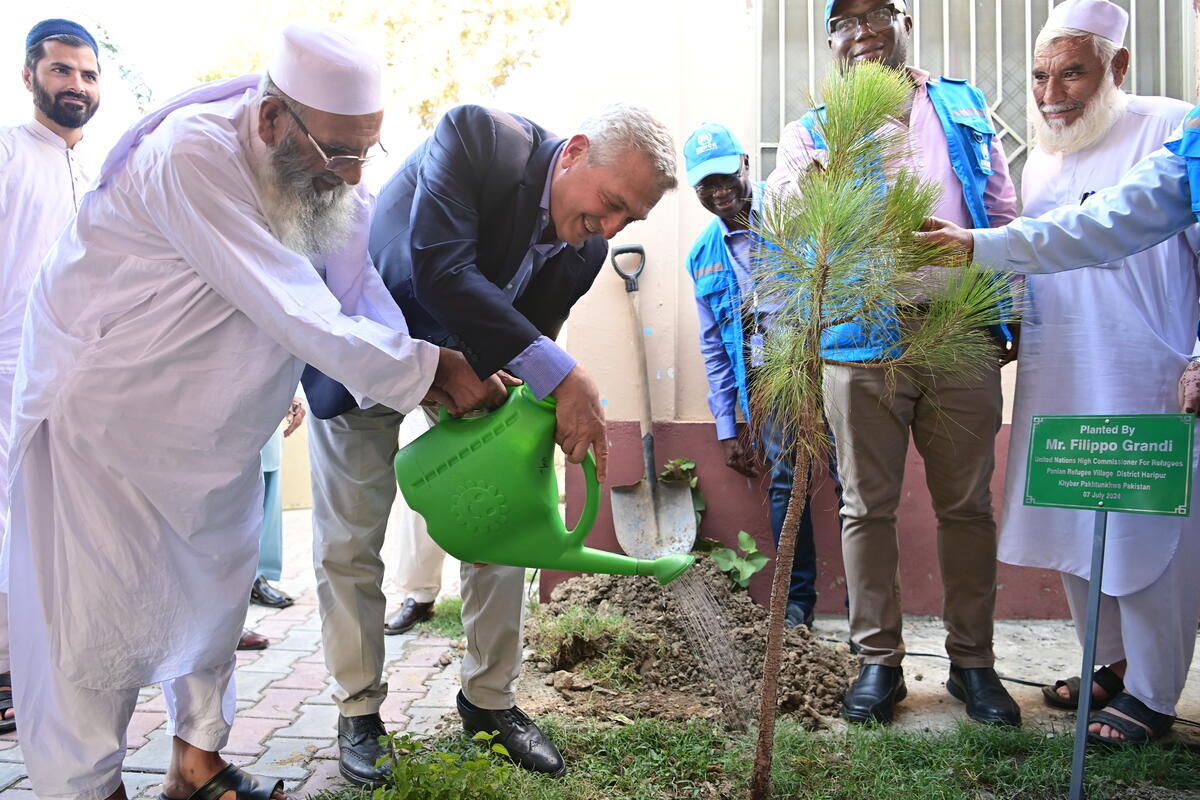Afghanistan Humanitarian Update No. 8
Afghanistan Humanitarian Update No. 8
At a Glance:
- Pakistan officials announce that borders will remain closed to Afghans without travel documents, but those managing to cross illegally will be assisted in camps in the country.
- UNHCR is concerned about the suffering of Afghan civilians due to border closure policies practised across the region.
- UNHCR seeks US$ 252 million for looming Afghan crisis.
Pakistan
Pakistan authorities said today that borders will remain closed to Afghans without proper travel documents, but have indicated that people who manage to cross illegally will be assisted in camps in Pakistan. Pakistan authorities also announced that officials in Balochistan province are considering allowing women, children and elderly people waiting at the Chaman border entry point to cross for humanitarian reasons.
While understanding the extremely tense and complex situation facing the governments bordering on Afghanistan, including significant national security concerns, UNHCR is nevertheless concerned that Afghan civilians are already suffering from border closure policies across the region. Many Afghans are now stalled at frontiers inside their country, where the humanitarian situation as well as general security is deteriorating by the day.
UNHCR does note with appreciation the government of Pakistan's readiness to shelter large numbers of Afghans should they be forced to temporarily flee their country. Joint planning missions are already underway in border areas to ready Pakistan's border regions for such a movement. UNHCR also appreciates that Balochistan provincial authorities are considering allowing some people to cross at the main Chaman crossing point for humanitarian reasons. Some 10,000- 20,000 people are estimated to be waiting at Chaman, around half of them without any shelter.
UNHCR Pakistan, echoing recent statements by Secretary-General Kofi Annan and High Commissioner for Refugees Ruud Lubbers, is very concerned that the border closures are already unnecessarily worsening the humanitarian predicament faced by the Afghan people, and could result in civilian deaths, particularly of women and children.
UNHCR reiterates its firm commitment to assist the government of Pakistan as well as Afghanistan's other neighbours in caring for any new Afghan arrivals, and asks the broader international community to help shoulder the burden posed by any new influx.
Lubbers on September 20 called for borders to remain open so that desperate Afghans could be protected. "In particular we ask that borders remain open to all persons having to flee, not least because of the deteriorating security situation," he said. He also called for a humanitarian coalition to help those fleeing, and assured neighbouring states of UNHCR's assistance.
Secretary-General Annan on September 25 said in a statement, "Many Afghans are trying to flee the country, but find it difficult to cross the borders. In accordance with international law, the borders must be open to civilians seeking refuge. At the same time, the international community must send swift and generous help, so that refugees do not become an impossible burden on the neighbouring States."
In the meantime, a survey team, including UNHCR, Oxfam and local authorities with the Afghan Commissionerate for Refugees, have gone to the border area near Quetta to look at two potential refugee reception sites. These are Darra, which is around 12 kilometres north of the Chaman border crossing, and Sirki Taleri, which is about 8 kilometres east of Chaman. The team will focus particularly on the water supplies available at each of these sites, and on whether they can be improved.
Darra is an old refugee settlement dating back to the 1980s, when it accommodated up to 20,000 people. However, the current capacity is likely to be around half that number. Among other things, the team will examine the current condition of two underground water channels from the nearby mountains. Sirki Taleri is a new site. It apparently contains one functioning water channel. Depending on the team's findings, UNHCR intends to start rehabilitation of water supplies. Balochistan, along with Afghanistan and large areas of Iran, has suffered particularly badly from the terrible drought that has affected this region over the past four years.
Funding
UNHCR today said it needed US $252 million to respond to a large-scale humanitarian emergency in and around Afghanistan. In a funding appeal presented to donors, UNHCR said it was preparing for an influx of up to one million refugees into Pakistan, 400,000 into Iran, 50,000 into Tajikistan and 50,000 into Turkmenistan. UNHCR is also making additional contingency plans to supply aid to 500,000 people inside Afghanistan if the need arises.
"These figures are based on the worst-case scenario but then we simply must be prepared for the worst," said High Commissioner Lubbers.
UNHCR said it could deploy up to 700 international and local staff to deal with the looming crisis, in addition to more than 500 staff already working in countries neighbouring Afghanistan.
"Today, we are witnessing an unprecedented global effort to combat terrorism. We need a similarly unique effort to deal with possible humanitarian consequences of whatever happens in Afghanistan. We count on the donors' generosity," said Lubbers.
The contingency plan outlines a massive relief effort which involves the construction and maintenance of refugee camps and the delivery of more than 80,000 tents, hundreds of thousands of health and hygiene kits and a huge amount of other relief items, many of which would have to be airlifted to Pakistan and Iran. The amount sought is supposed to cover the agency's needs over the next six months.








